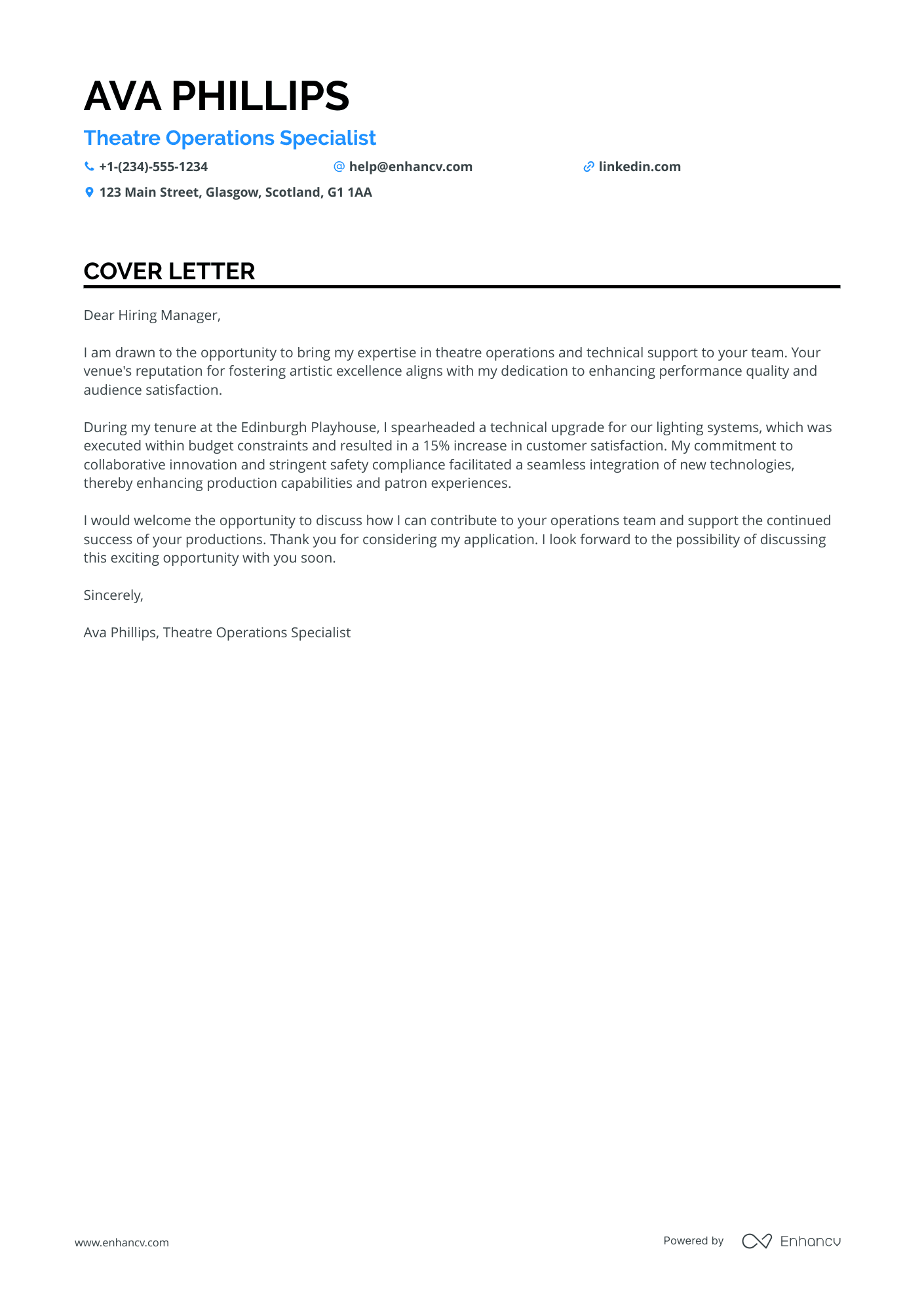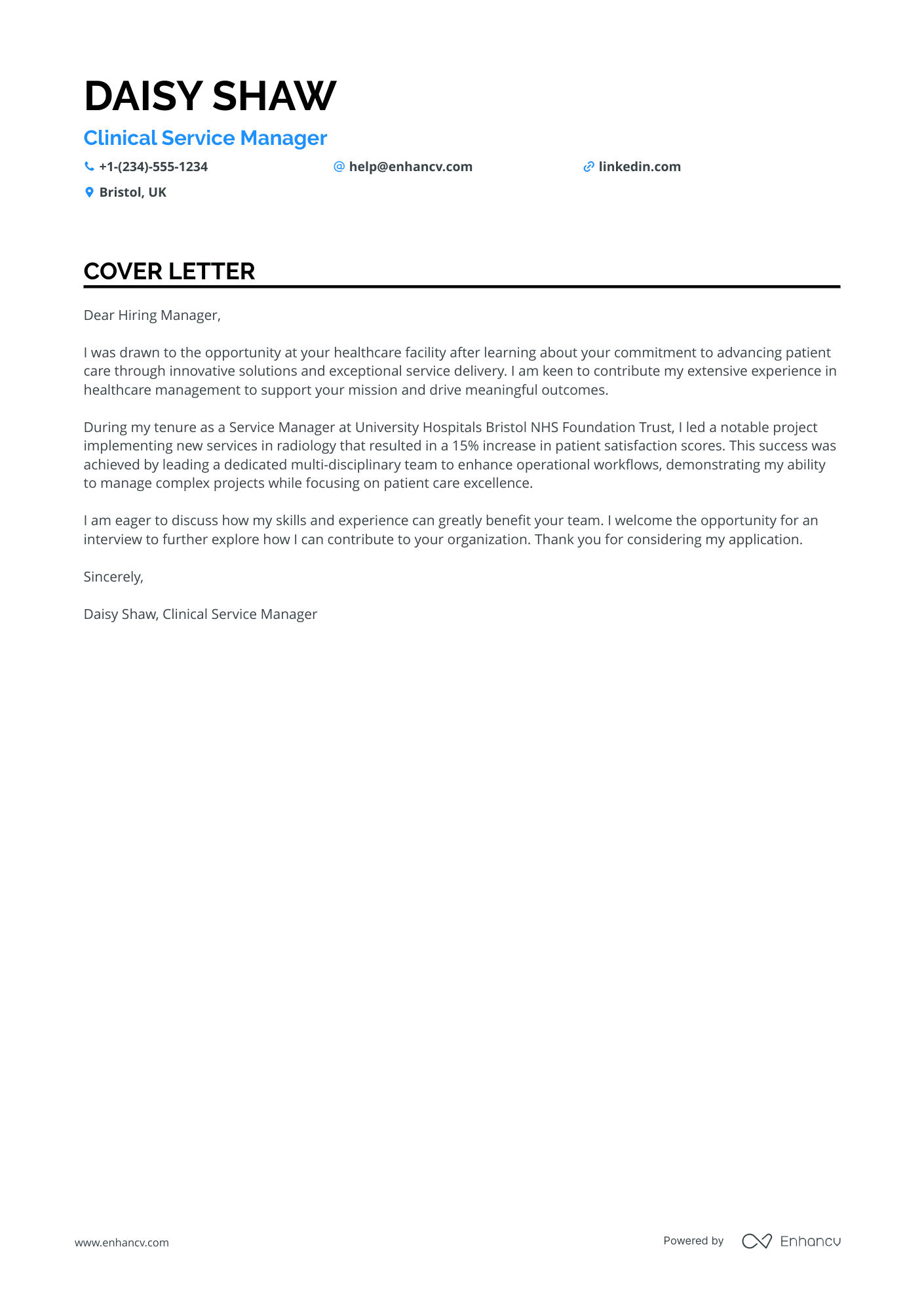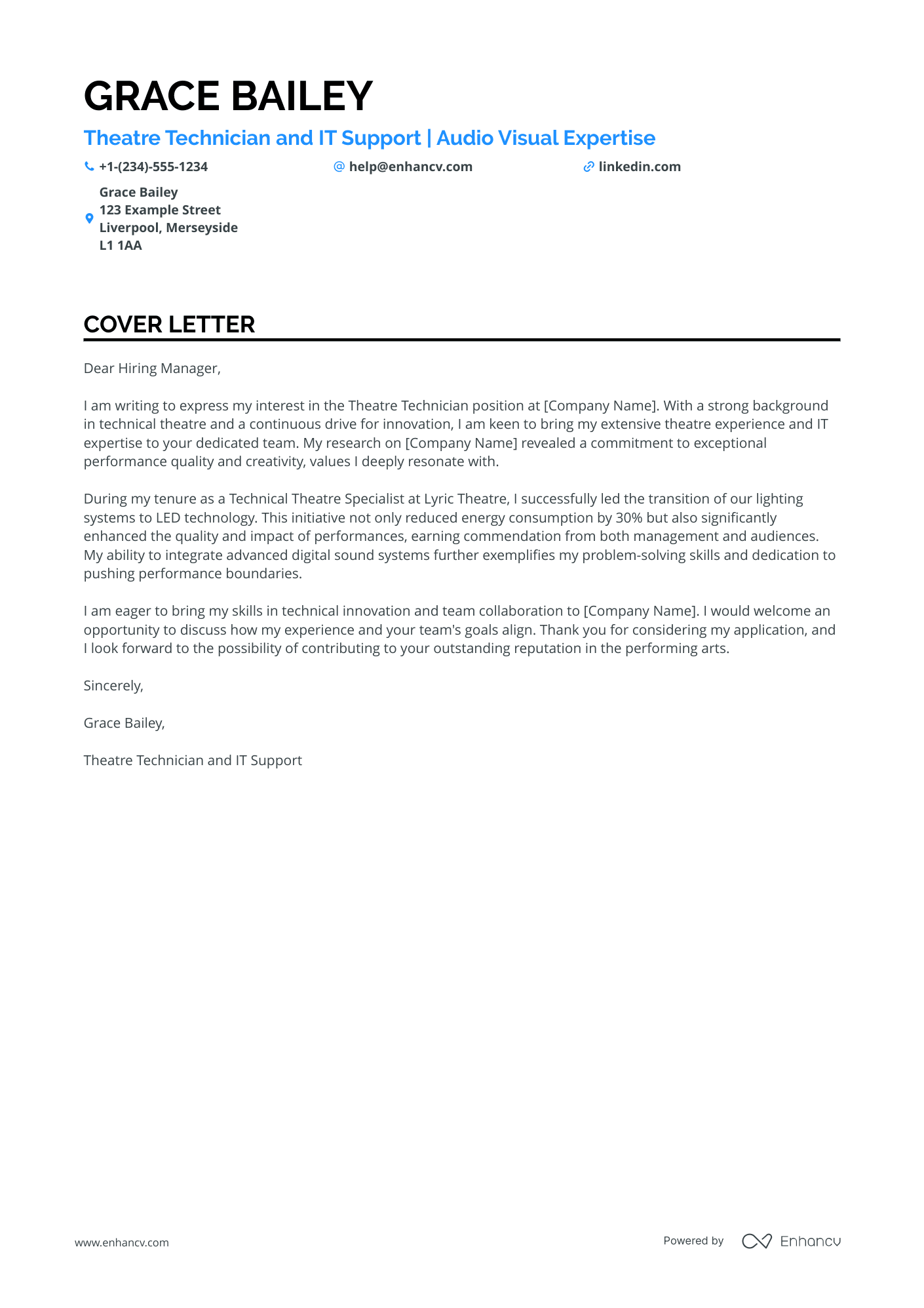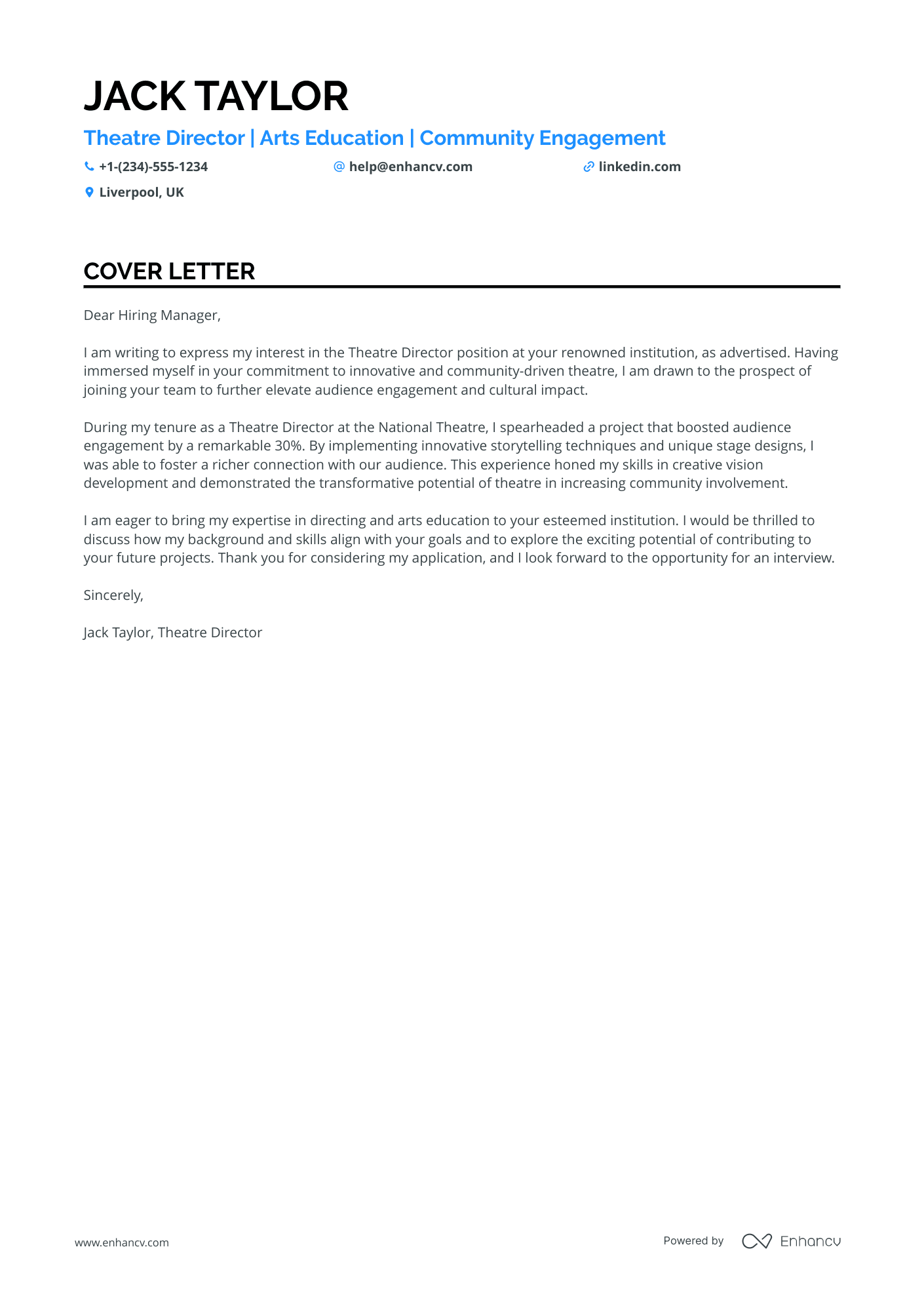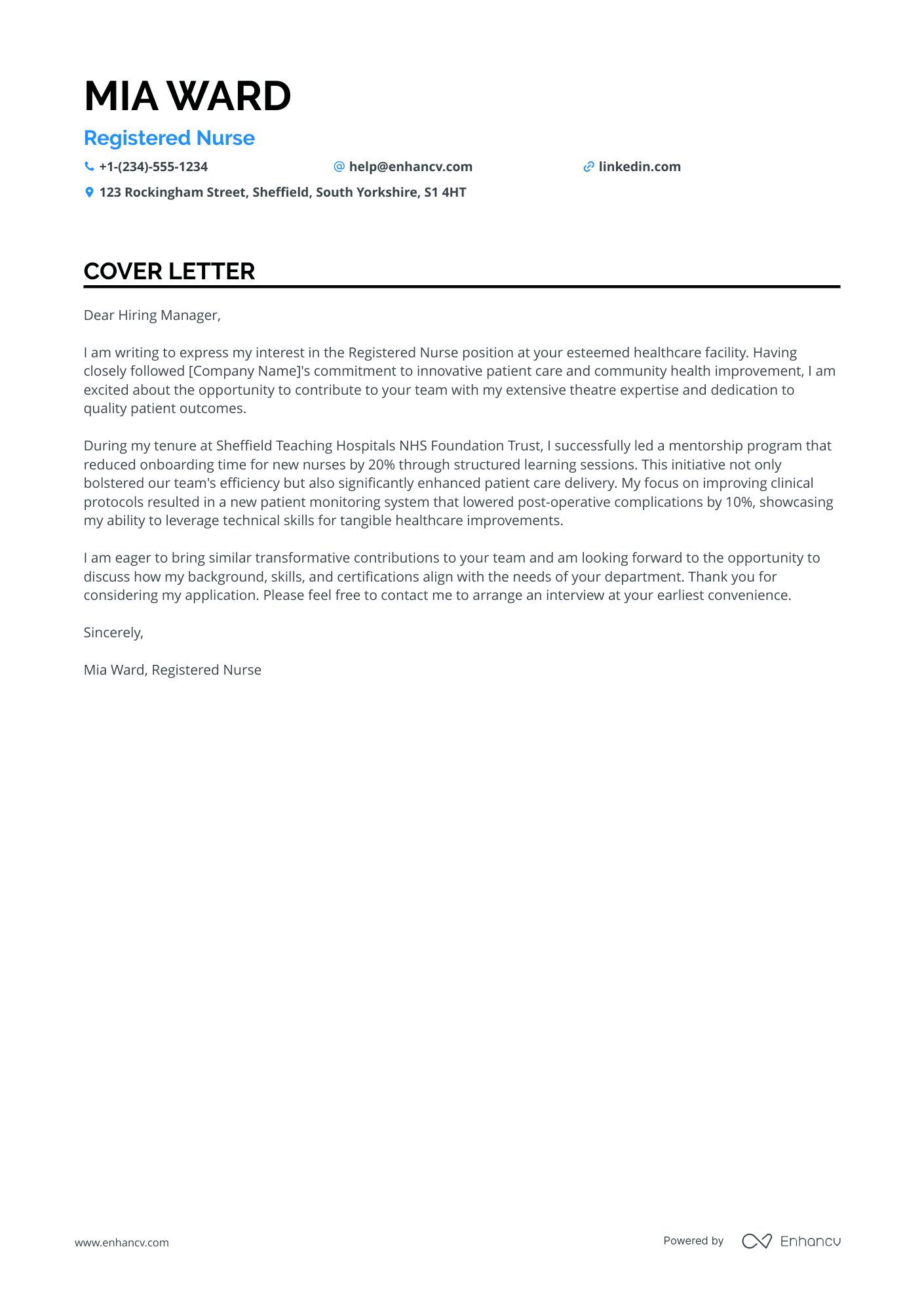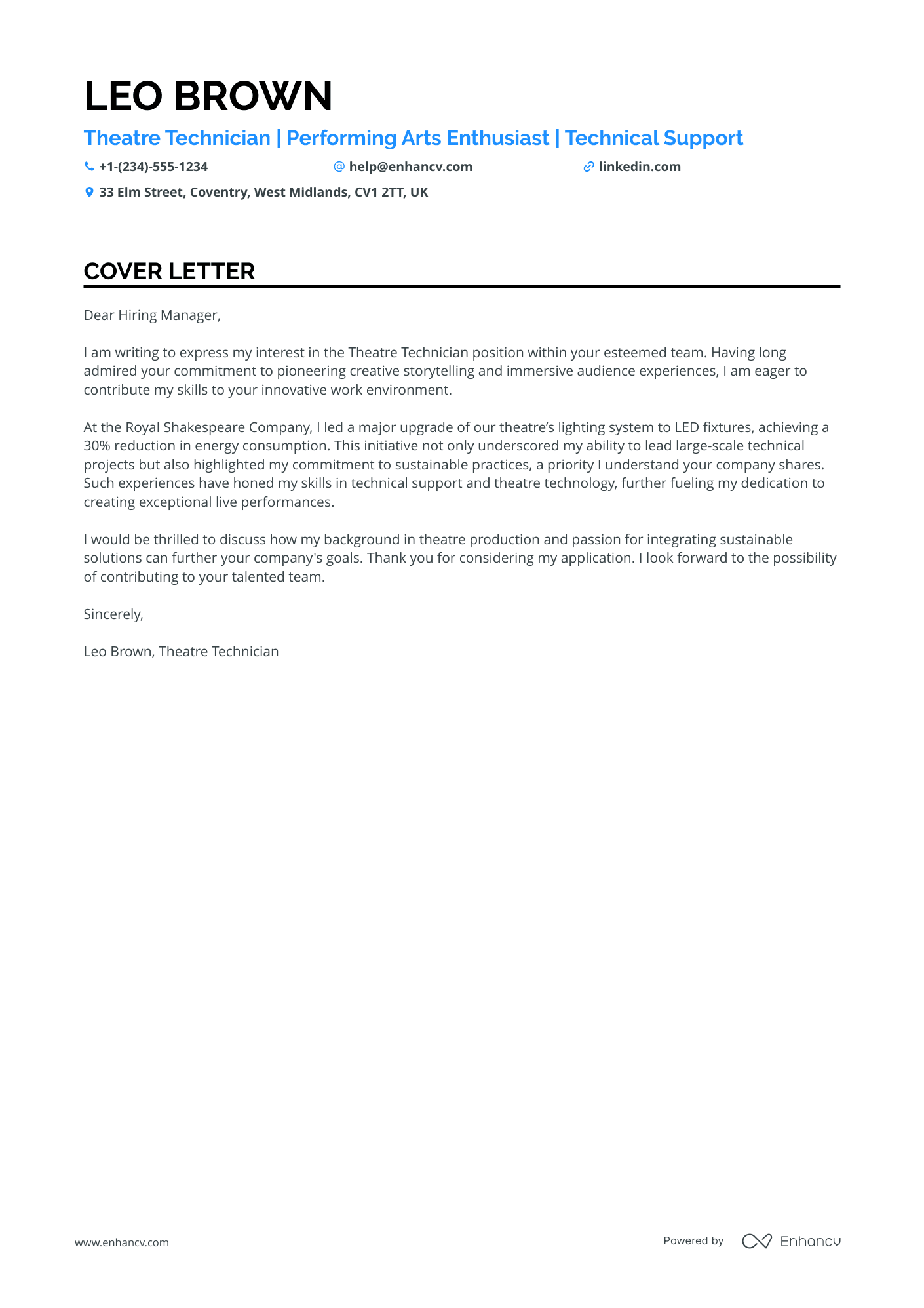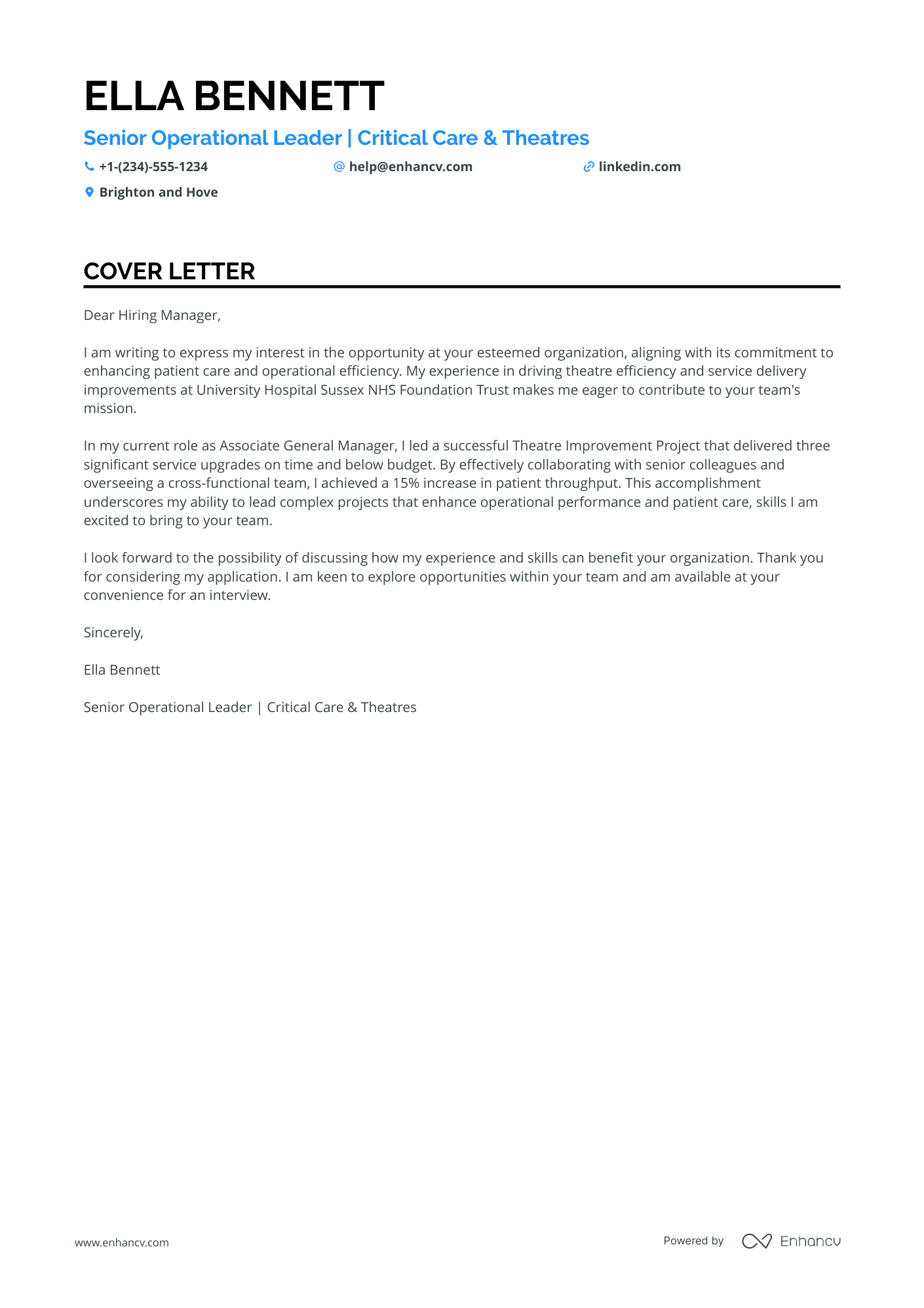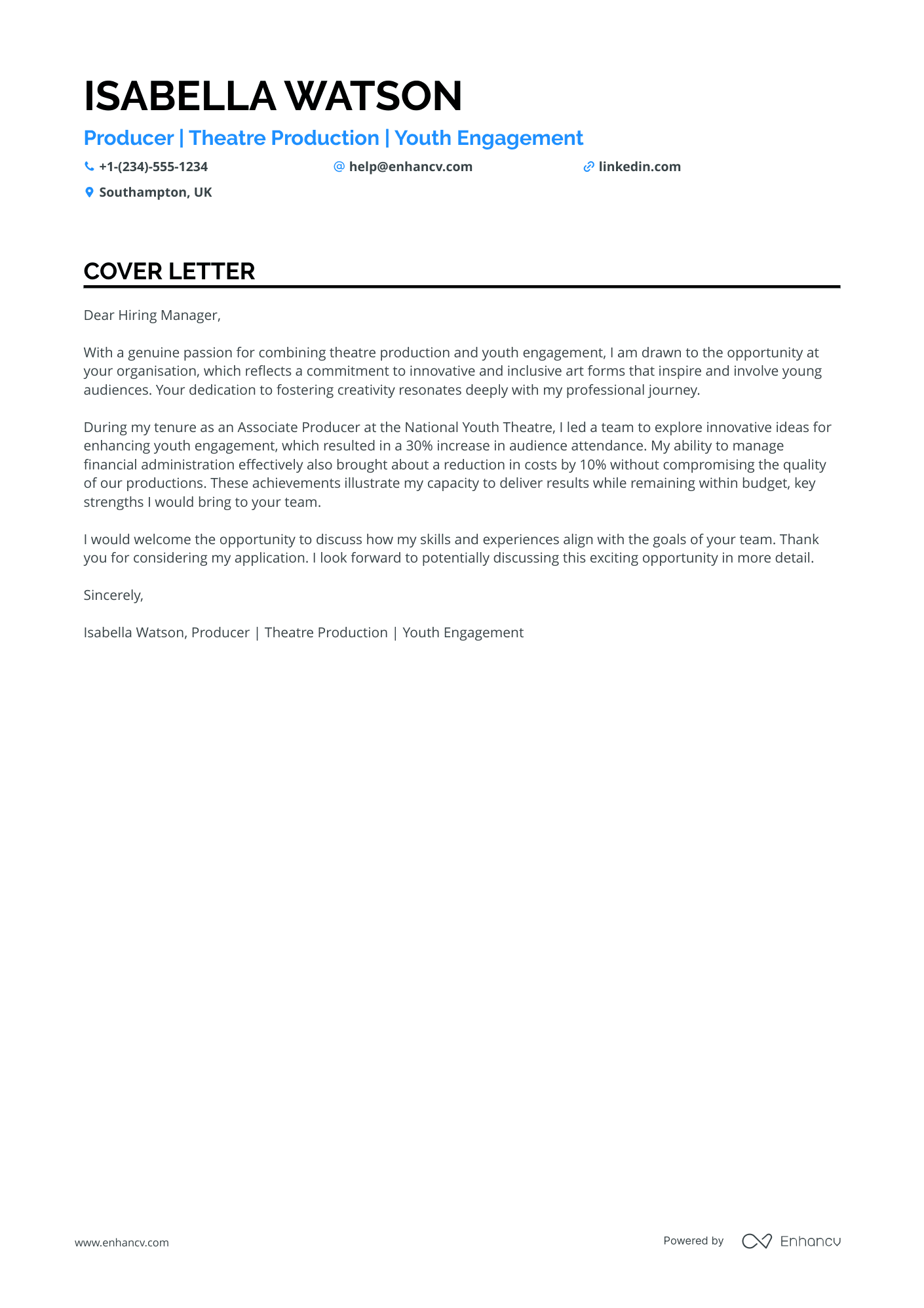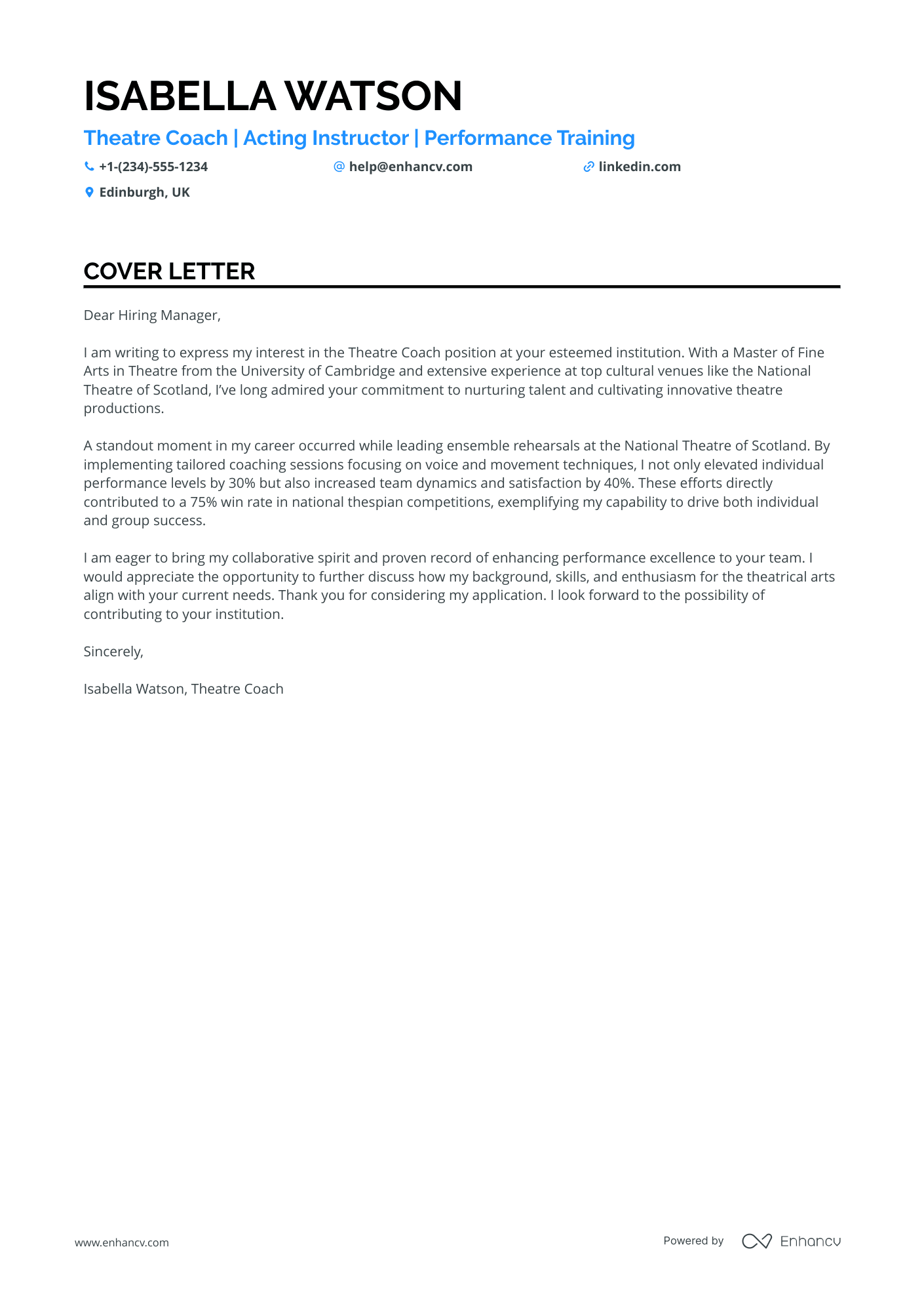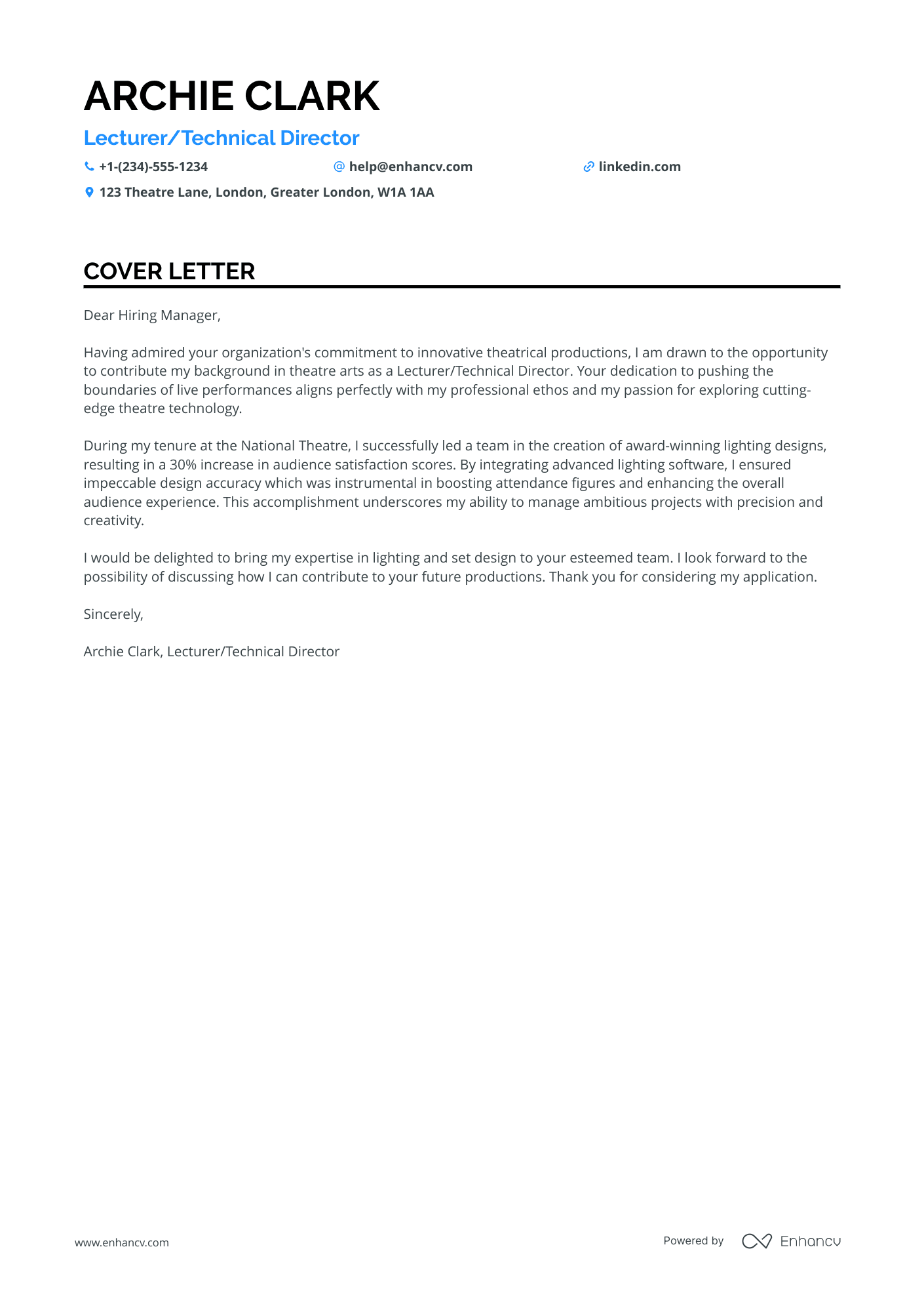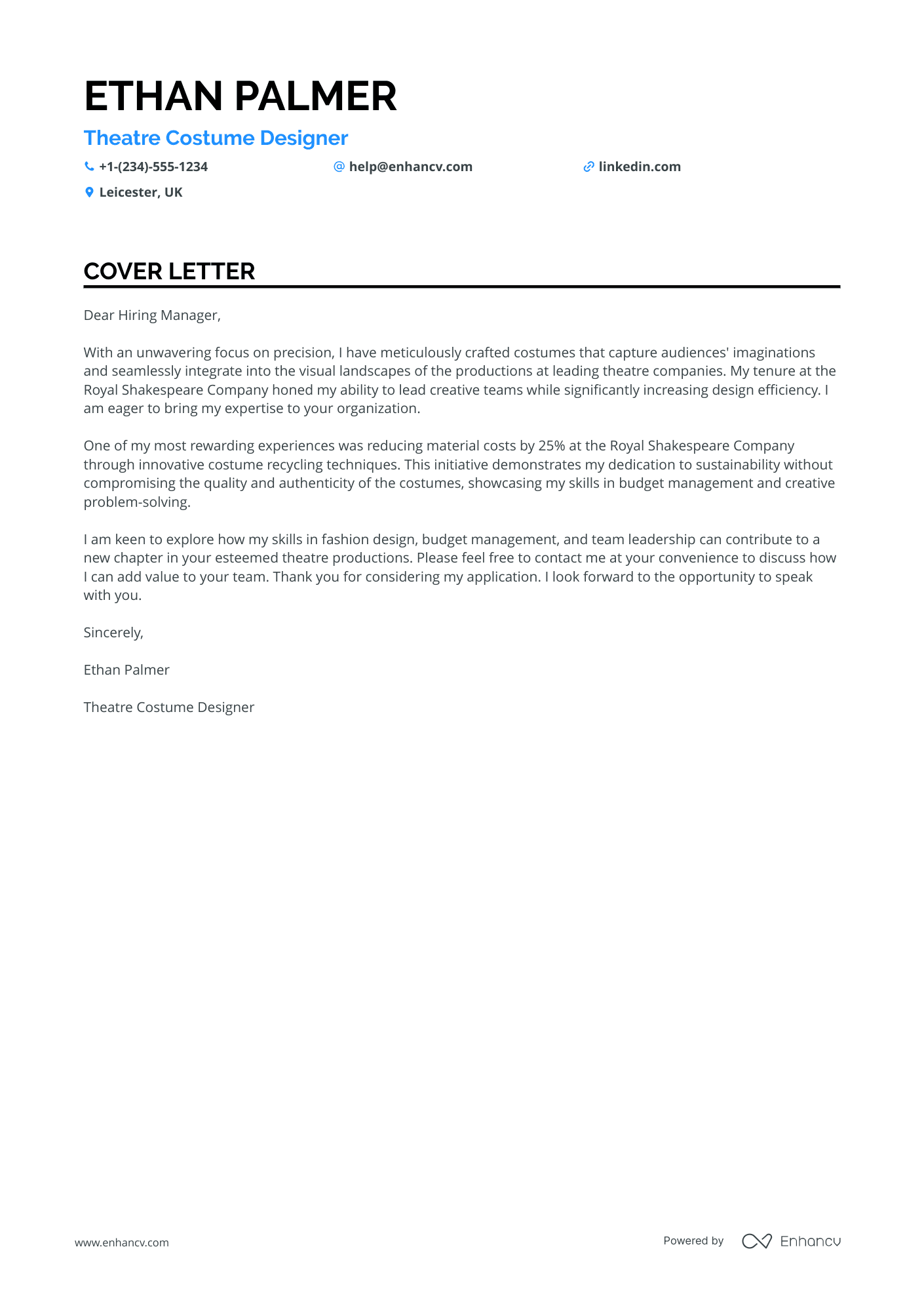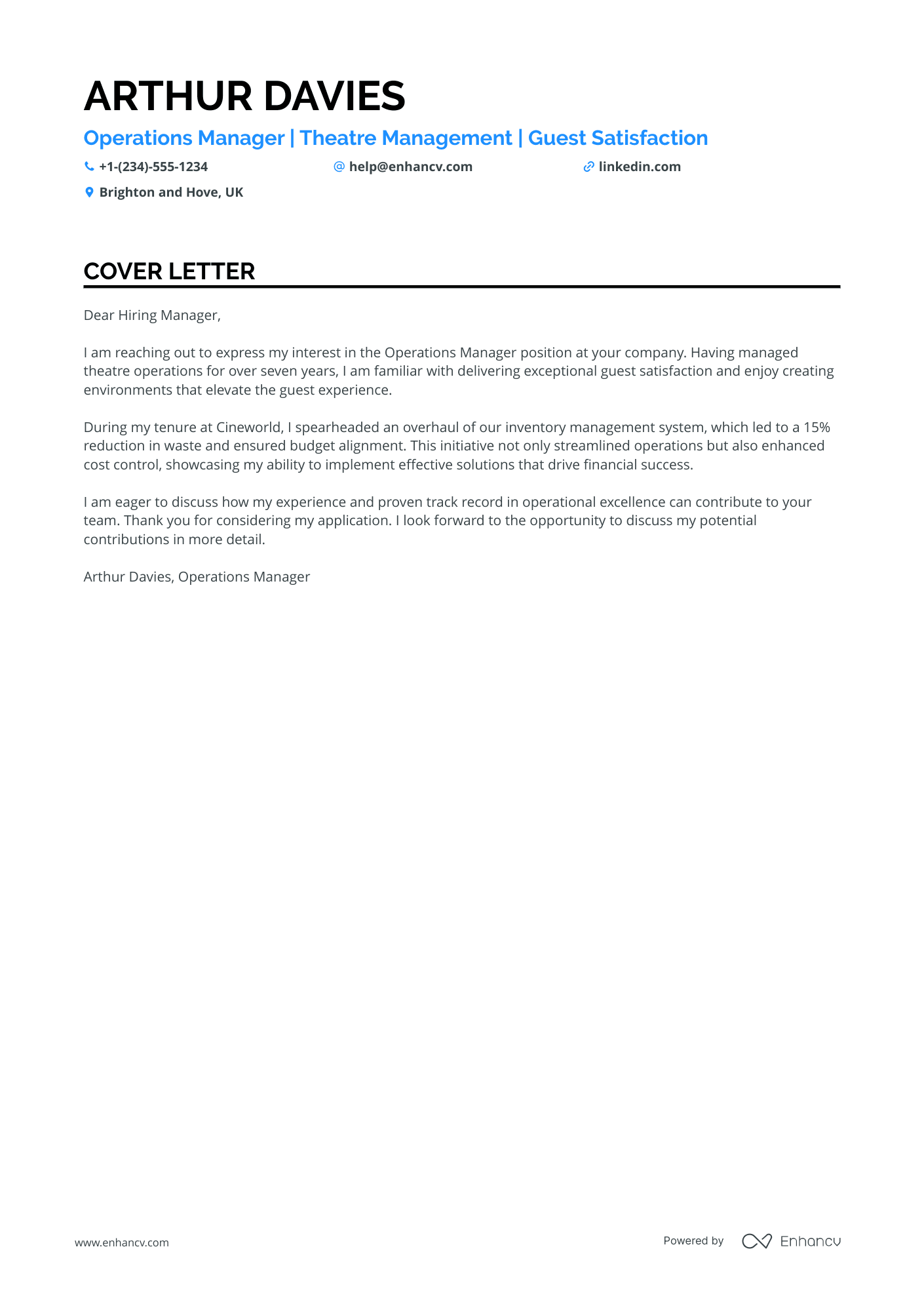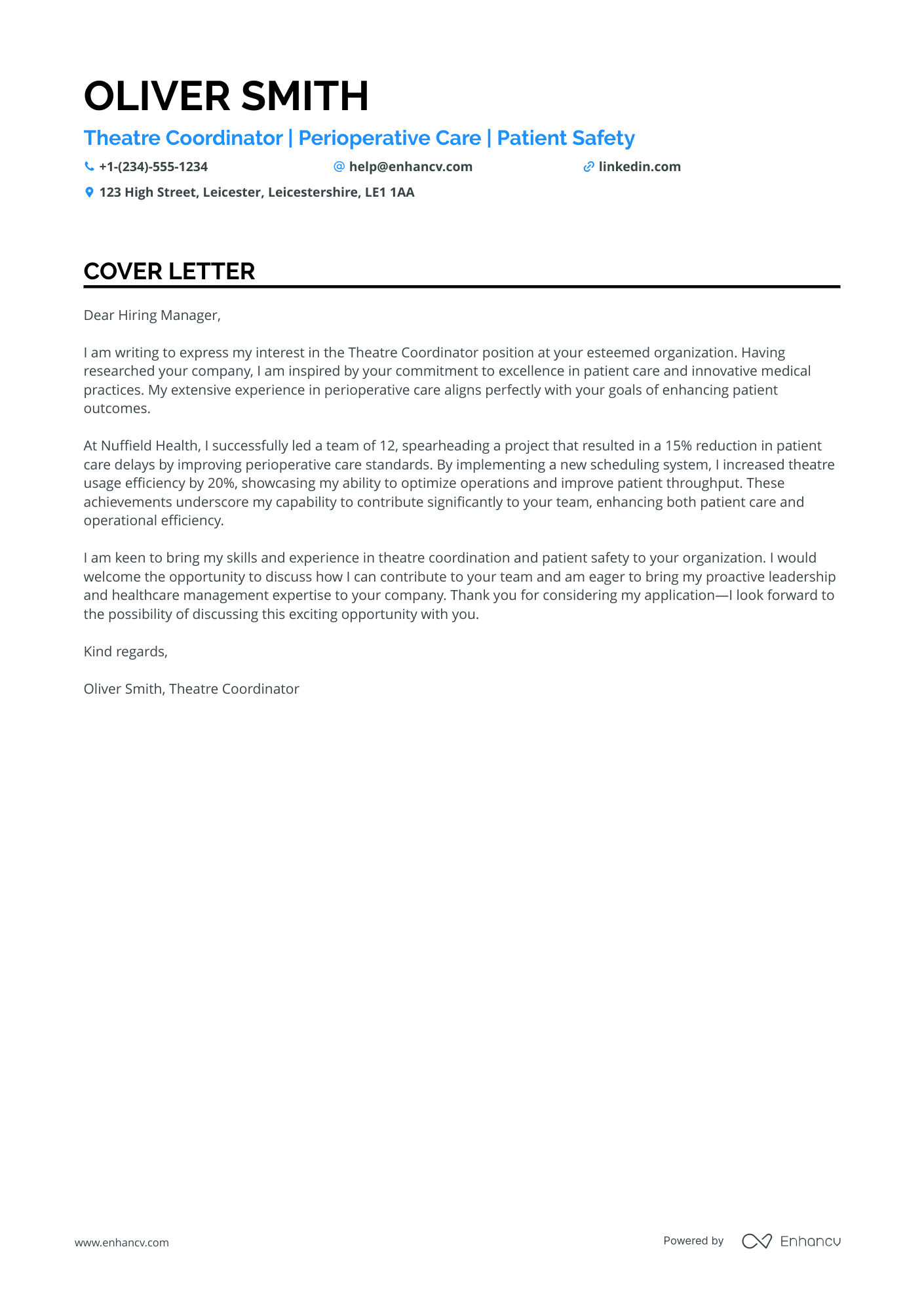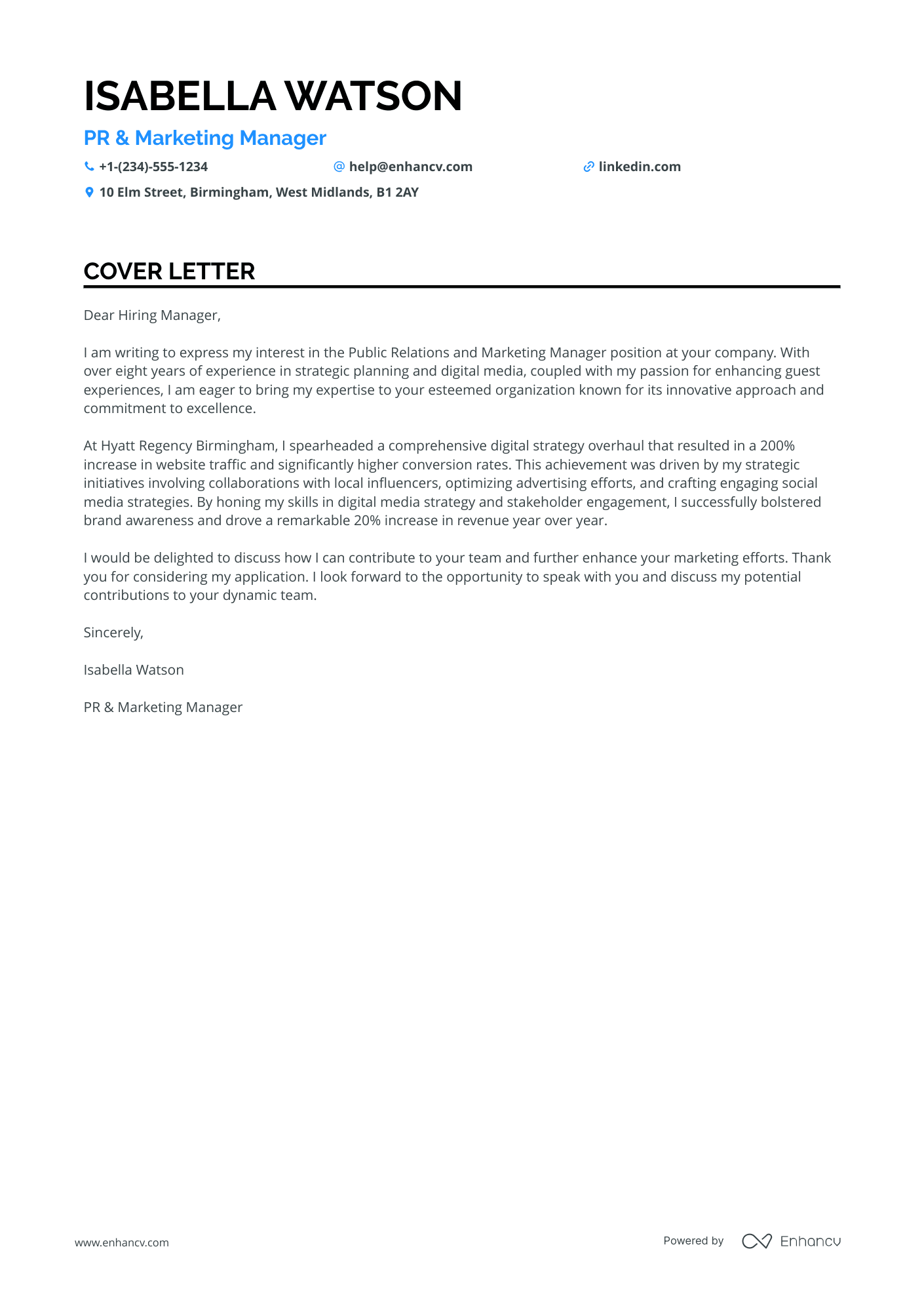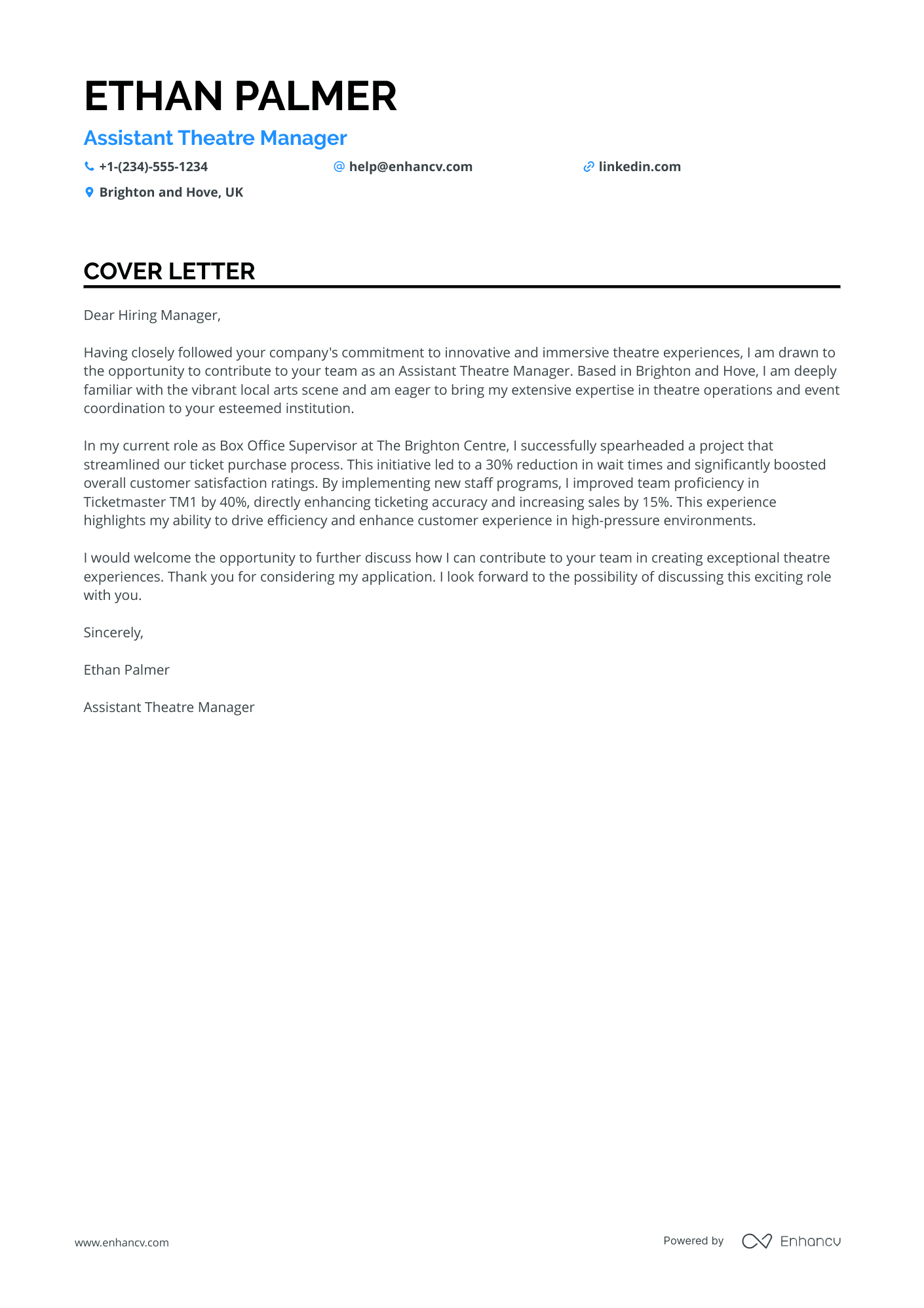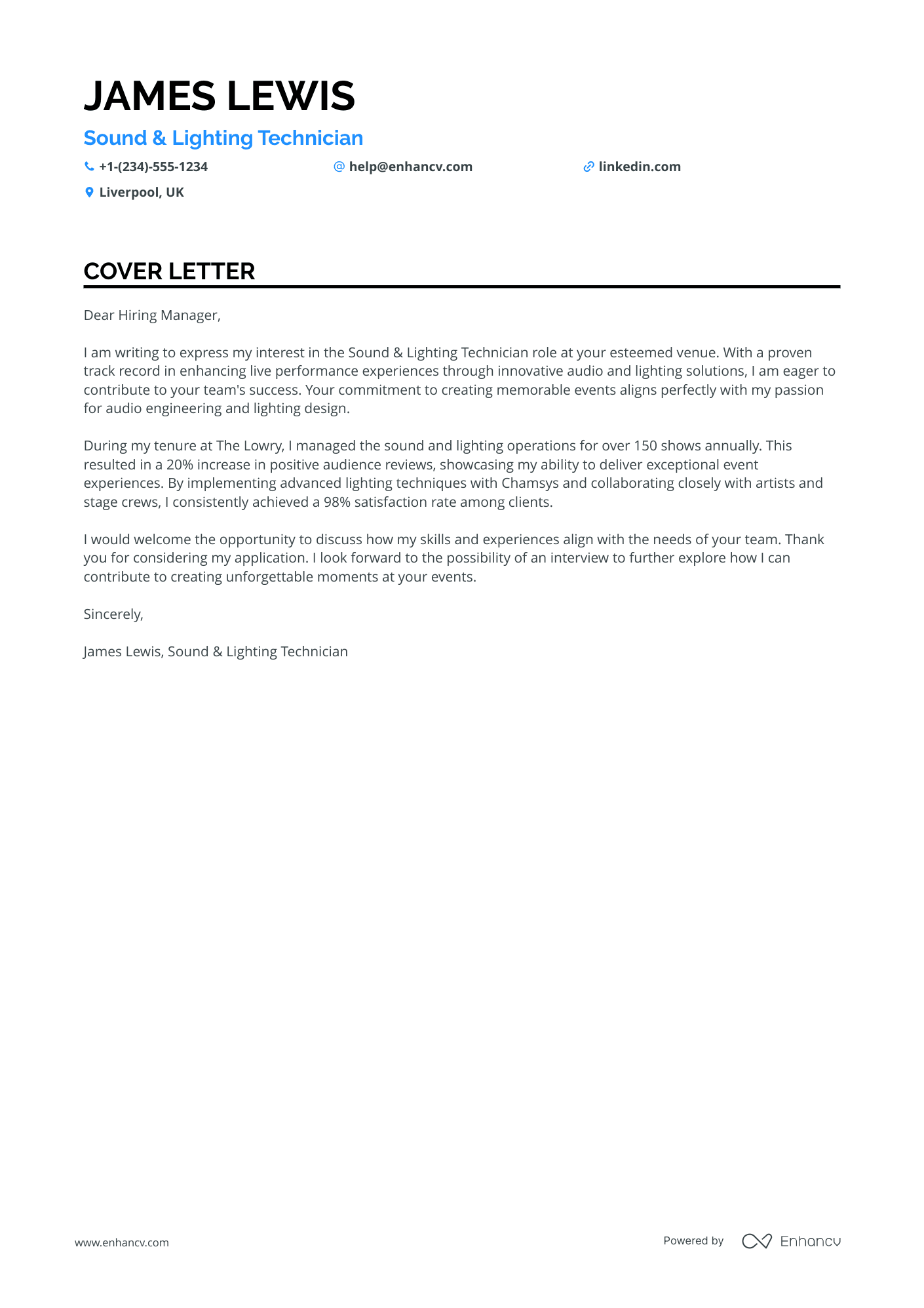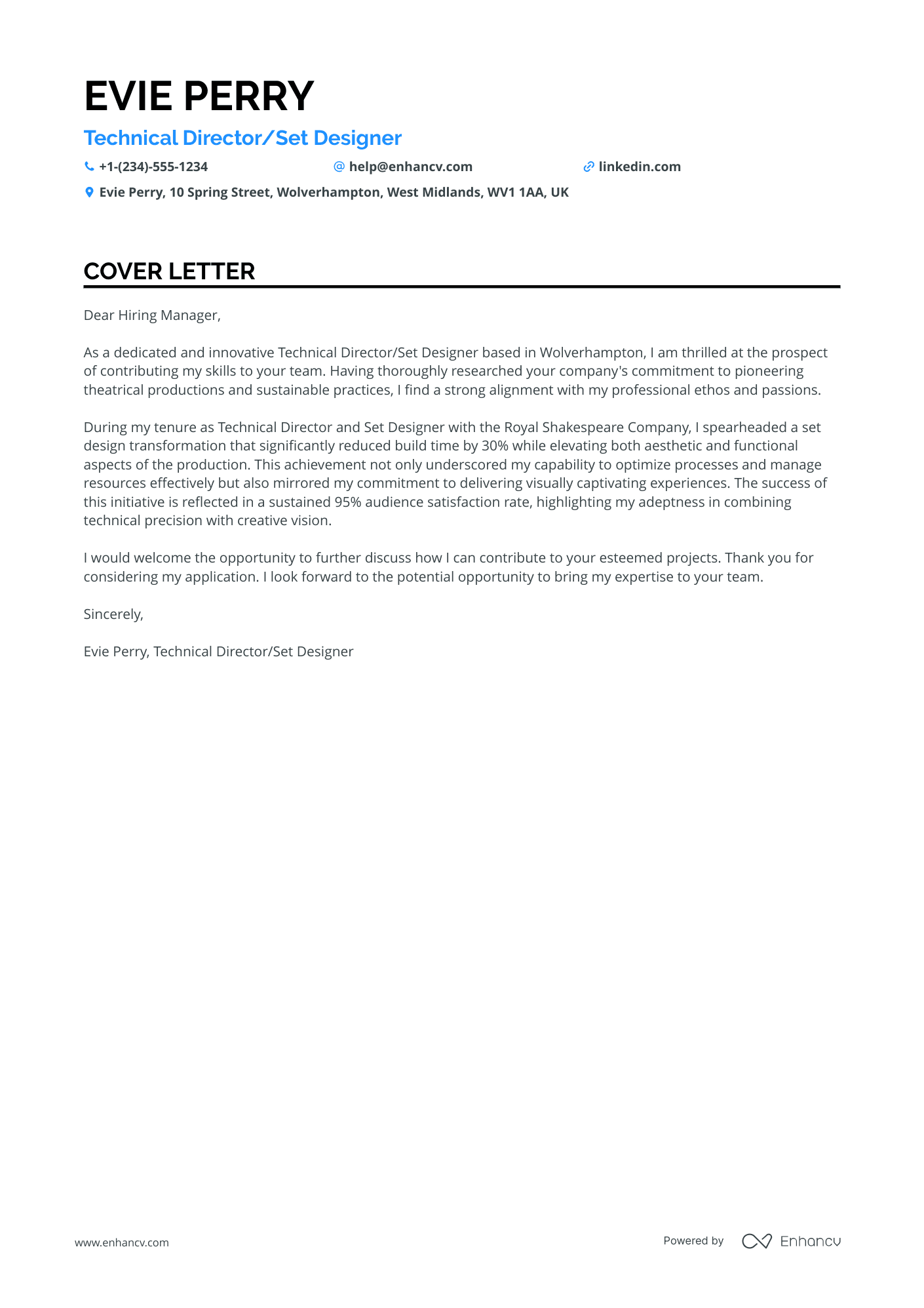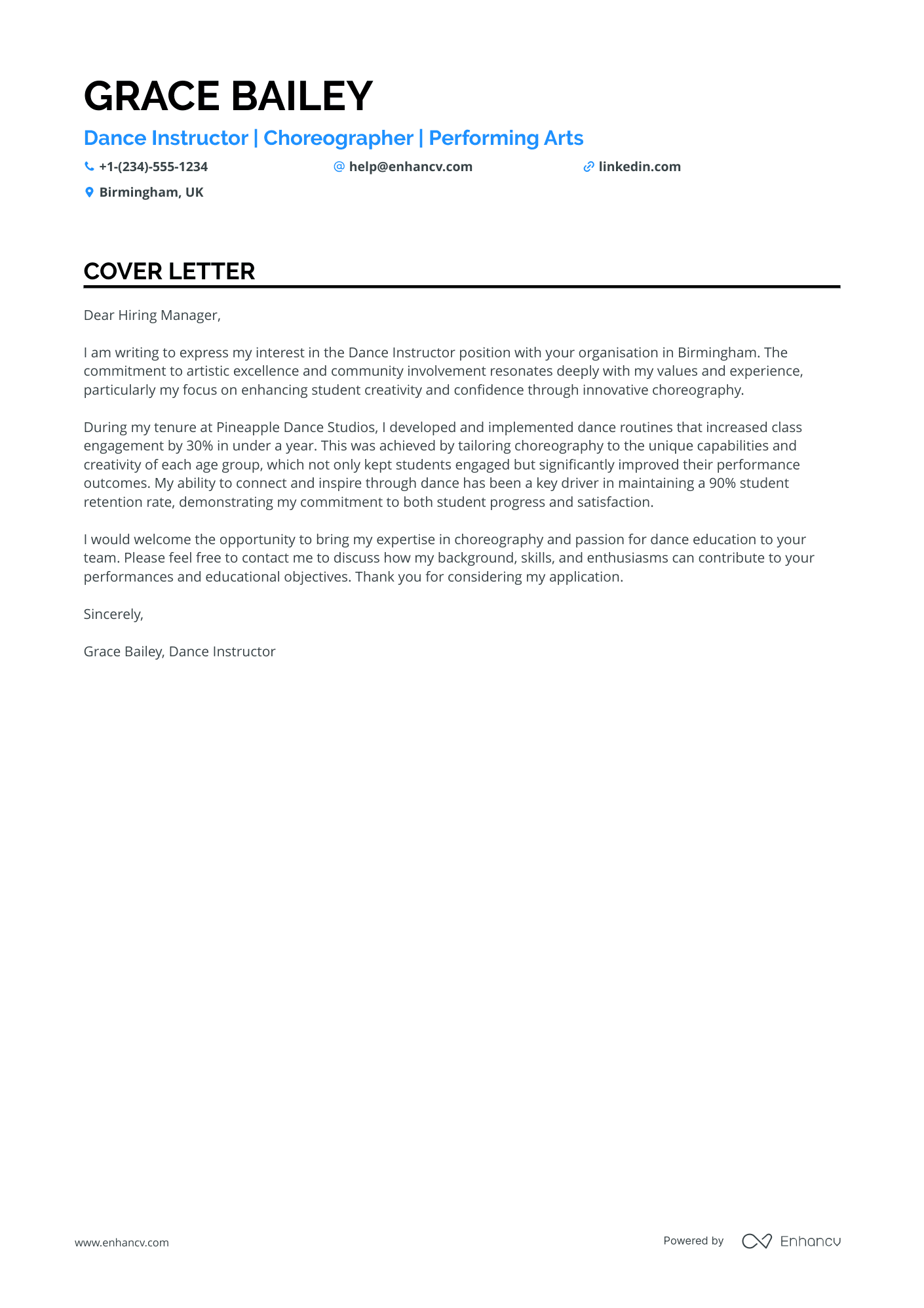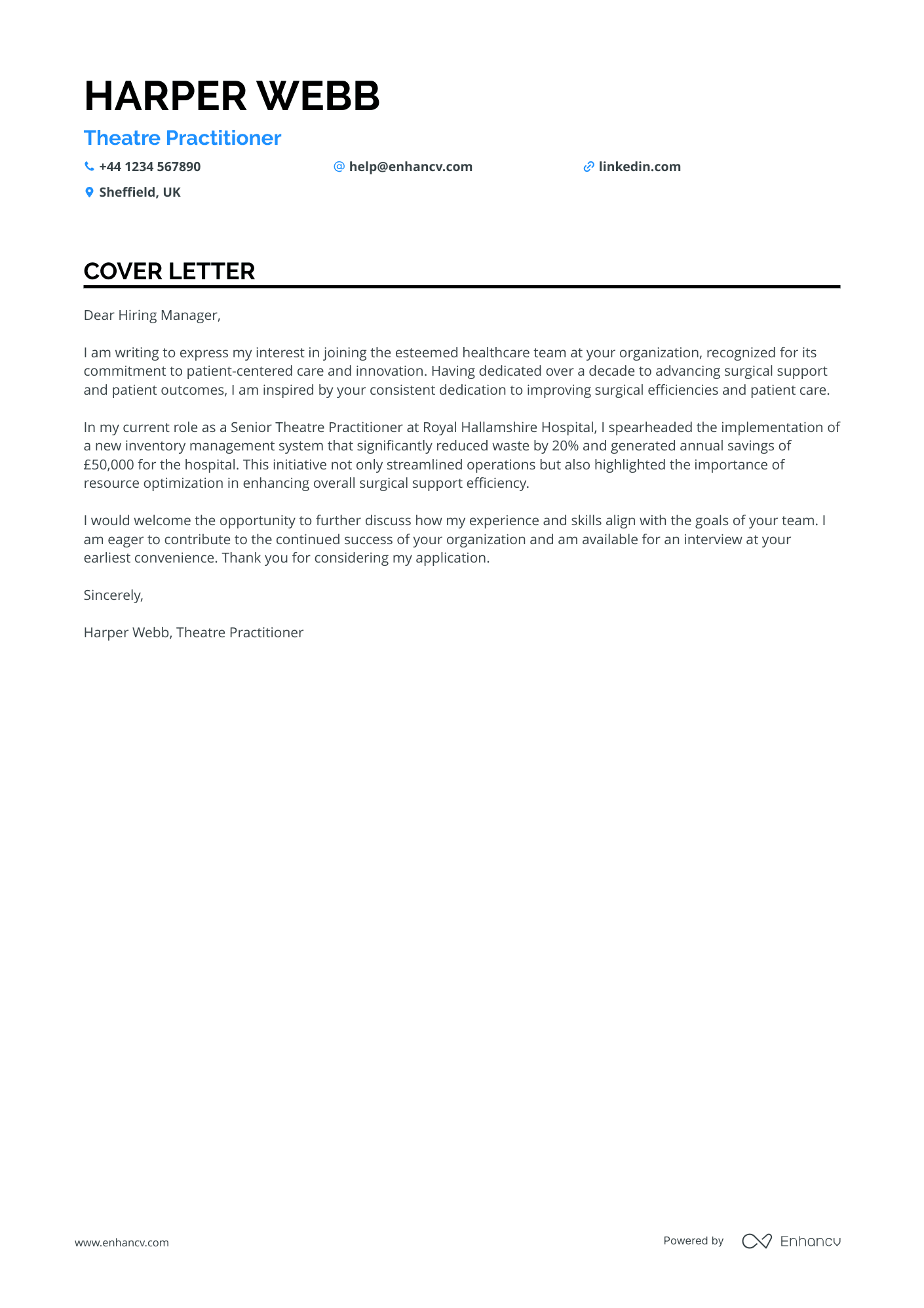You want your cover letter to strike the perfect balance between being professional and showing some personality. But how do you achieve this?
If you write too formally, your tone may come across as stiff. If you're too casual, it may sound overly conversational.
While modesty is always valued, how can you confidently present your skills without sounding arrogant or boastful?
This guide will help you find the right balance, ensuring your cover letter is both professional and personable, while focusing on the key job requirements.
Cover letter examples for theatre
By Experience
Entry-Level Theatre Assistant
- Highlighting Relevant Experience: The cover letter effectively showcases Ava's extensive experience in technical coordination and stage management across prestigious venues, which is crucial for the Theatre Operations Specialist role.
- Emphasising Technical Skills: It adeptly highlights key skills such as AV Equipment Operation, Theatrical Lighting, and Stage Rigging, which are essential for technical support positions in theatre operations.
- Showcasing Achievements: The cover letter uses quantifiable achievements, such as increasing audience satisfaction by 20% and reducing technical downtime by 30%, to demonstrate Ava's impact and effectiveness in previous roles.
- Education and Professional Development: Ava's educational background in Technical Theatre and completion of specialised courses in Stage Lighting and Safety in Theatre Operations are well-presented, highlighting her commitment to continuous learning and professional growth.
Senior Theatre Manager
- Highlighting Leadership and Management Skills: Emphasise your leadership capabilities and experience in managing teams effectively, as showcased in the example where team efficiency was improved by 25%.
- Demonstrating Concrete Achievements: Quantify your impact with specific figures, such as a 30% improvement in service delivery, to effectively demonstrate your contributions to improved patient outcomes and operational efficiency.
- Showcasing Relevant Education and Training: Mention advanced degrees and relevant courses, like the Master of Healthcare Management and courses on Advanced Healthcare Leadership and Budgeting, to reinforce your specialised knowledge.
- Emphasising Passion for Patient Care: Illustrate your commitment to enhancing patient experiences and outcomes, aligning your personal mission with the organisational goals of healthcare institutions.
Experienced Theatre Technician
- Combination of Expertise: The cover letter effectively highlights Grace Bailey's dual expertise in theatre technology and IT support, making her uniquely qualified for roles that require cross-functional skills in both areas.
- Project and Impact Highlighting: The letter showcases specific projects, such as the transition to LED lighting and digital sound system integration, and quantifies their impact, demonstrating Grace's ability to drive innovation and efficiency.
- Education and Certification Relevance: The inclusion of a Master's degree in Technical Theatre and a Cisco certification underscores her formal training and foundational knowledge, strengthening her credentials for technical roles within the arts.
- Soft Skills and Passion: Profiles additional skills such as creative collaboration and workshop facilitation, along with personal passions for technical theatre innovation and community projects, creating a well-rounded candidate profile.
By Role
Theatre Director
- Emphasises substantial experience in theatre directing, with over a decade in the field, highlighting specific success metrics such as increasing audience engagement by 30%.
- Underlines a strong ability to lead and manage both creative and operational aspects of theatre production, from collaborating with technical teams to managing substantial budgets efficiently.
- Showcases a well-rounded skill set that includes production management and team leadership while also focusing on community engagement and cultural education, relevant to enhancing local and artistic communities.
- Highlights notable achievements and recognition in the arts, such as the Audience Engagement Award and a Critics’ Choice Production, which underscore a proven track record of excellence and innovation.
Theatre Nurse
- Specialised Certifications: Highlighting the "Advanced Perioperative Nursing" course and "Infection Control Certification" demonstrates the candidate's advanced skills and specialisation, critical for roles in theatre nursing.
- Quantifiable Achievements: Including specific figures such as "500 surgical procedures" and "reduced onboarding time by 20%" effectively showcases the candidate's impact and expertise in enhancing operational efficiency and patient care quality.
- Leadership and Mentorship: Emphasising leadership roles, such as leading a mentorship program and supervising teams, underscores the candidate's ability to manage and improve team dynamics in high-pressure environments like the theatre.
- Research Contributions: Mentioning a research project that "contributed to a 5% reduction in patient recovery durations" and co-authorship of a research article demonstrates the candidate's commitment to evidence-based practice and continuous improvement in patient outcomes.
Theatre Technician
- Detailed Experience and Achievements: The cover letter effectively showcases Leo's extensive experience in theatre technology through specific achievements, such as leading a 30% energy reduction initiative with LED lighting and achieving high audience satisfaction scores.
- Relevant Education and Certifications: Highlighting degrees like a Master of Fine Arts in Theatre Technology and relevant courses provides a strong foundation for the technical expertise required in this role.
- Leadership and Mentorship: Describing leadership roles and the development of training programmes illustrates Leo's capability to lead teams and contribute to skill development in aspiring technicians.
- Technical and Innovative Skills: Emphasising skills such as sound engineering, theatre lighting, and inventory management demonstrates key competencies necessary for a Theatre Technician and aligns with Leo’s passion for technology innovation.
Theatre Manager
- Highlight Relevant Experience: Ella Bennett's extensive background in theatre operations and critical care management is directly emphasised, showcasing over 10 years of experience in operational management and efficiency optimisation which aligns perfectly with the senior operational leader role.
- Use Quantifiable Achievements: The cover letter effectively uses statistical evidence to demonstrate success, such as achieving a 95% scheduling accuracy, improving patient throughput by 15%, and reducing consumable costs by 10%, demonstrating her ability to deliver measurable outcomes.
- Mention Specific Leadership Roles and Skills: Emphasising roles like leading a cross-functional team of 50+ professionals and skills such as budget management and service delivery highlights her leadership capabilities and her effectiveness in senior management roles.
- Point Out Continuing Education and Certifications: Ella mentions certifications in Lean Six Sigma for Healthcare and Advanced Theatre Management, illustrating her commitment to ongoing professional development and expertise in processes and theatre operations.
Theatre Producer
- Highlighting Industry Experience: The cover letter effectively underscores Isabella's extensive experience in theatre production and youth engagement, showcasing how her past roles have prepared her for the position.
- Emphasising Measurable Achievements: It details specific accomplishments such as a 30% increase in audience attendance and a successful 10% reduction in production costs, providing concrete evidence of her impact and capabilities.
- Showcasing Relevant Skills: The letter outlines key skills such as project management, financial administration, and social media marketing, demonstrating her well-rounded expertise needed for a producer role.
- Education and Specialised Training: Her formal education in Arts Management, combined with advanced courses in project management and digital marketing, reinforces her qualifications and commitment to the field.
Theatre Critic
- Relevant Experience: Isabella highlights her extensive experience as a Theatre Coach and Performance Trainer with reputable institutions, including the National Theatre of Scotland and the Edinburgh Fringe Festival, providing credibility and showcasing her leadership in the field.
- Specialised Skills: The cover letter details specific skills crucial for the role, such as Voice and Movement Techniques, Character Development, and Creative Collaboration, indicating her well-rounded coaching capabilities.
- Education and Training: Isabella underscores her academic background with a Master of Fine Arts in Theatre from the University of Cambridge and additional specialised courses in vocal and physical theatre, aligning her qualifications with the role's requirements.
- Quantifiable Achievements: The inclusion of measurable successes, like improving team performance metrics and increasing audience engagement, provides tangible evidence of her effectiveness and impact in previous roles.
Theatre Lighting Designer
- Highlighting Leadership and Team Management: The cover letter effectively emphasises the ability to lead and manage teams, which is crucial for a Technical Director role. Mentioning the management of a team of 10 and the result of 40% of students securing internships reinforces this leadership capability.
- Focus on Process Improvement and Efficiency: The cover letter demonstrates a commitment to improving production efficiency by 30%, showcasing the candidate's ability to enhance operational processes and increase productivity, a valuable skill for managerial and directing positions.
- Showcasing Technical and Creative Expertise: With references to integrating cutting-edge technology and managing large inventories without incidents, the candidate effectively highlights a blend of technical skills with creative prowess, essential for roles in theatre arts production and management.
- Achievements and Recognition: Highlighting specific achievements such as award-winning production designs and cost-reduction strategies demonstrates the candidate's impact and success in their previous roles, appealing to potential employers looking for proven effectiveness.
Theatre Costume Designer
- Highlighting leadership and team coordination skills is crucial for a senior role like Theatre Costume Designer, as demonstrated by the management and mentoring of junior designers and volunteers.
- Showcasing a strong portfolio of experience with reputable theatre companies, such as the Royal Shakespeare Company and National Theatre, reinforces credibility and industry reputation.
- Emphasising achievements in budget management and efficiency, such as achieving a 25% material cost reduction through recycling methods, illustrates the ability to balance creativity with financial constraints.
- Detailing specific technical and creative skills, such as historical research and fashion design expertise, which are essential to creating authentic and compelling costumes for theatre productions.
Theatre Operations Manager
- Arthur emphasises over 7 years of relevant experience in theatre operations, which aligns well with the specialised requirements of the Operations Manager role.
- He effectively highlights his ability to improve key metrics such as guest retention and Net Promoter Score, showcasing his focus on customer satisfaction and business growth. This is crucial for a role centred around guest experience.
- The cover letter underscores Arthur's expertise in cost control by detailing a successful initiative that reduced operating costs by maintaining expenses at 12% under budget.
- Arthur displays a comprehensive set of managerial skills such as budget management, staff training, and safety compliance, which are all vital to overseeing theatre operations effectively.
Theatre Education Coordinator
- Highlighting Leadership in Healthcare Settings: The cover letter effectively showcases leadership roles, essential for a Theatre Coordinator, by describing achievements in managing teams and improving staff morale.
- Emphasising Achievements in Patient Safety and Protocols: It demonstrates a track record in enhancing patient safety, such as reducing medication errors and increasing compliance with safety audits, aligning with the core responsibilities of a Theatre Coordinator.
- Showcasing Experience with Multi-disciplinary Teams: The applicant clearly outlines experience in cross-departmental communication and coordination with multi-disciplinary teams, which is crucial for ensuring high-quality patient care.
- Education and Certification: The inclusion of an MSc in Healthcare Management and relevant courses such as the Advanced Perioperative Practice Course highlights a commitment to continued professional development and specialised knowledge.
Theatre Marketing Manager
- Specific Achievements: The cover letter effectively highlights significant achievements such as doubling social media engagement and increasing revenue by 20%, which demonstrate the candidate's ability to deliver impactful results.
- Industry Experience: With over 8 years of experience in the hospitality sector, the cover letter places a strong emphasis on the candidate's industry-specific knowledge, making it relevant for the role.
- Relevant Skills and Education: The mention of a Master's in Marketing and skills in digital media strategy, social media management, and brand development align well with the responsibilities of a PR & Marketing Manager.
- Real-World Impact: The candidate underscores the practical impact of their work through examples like enhanced guest experiences and successful partnerships, aligning with the goals of a hospitality-focused marketing role.
Theatre Box Office Manager
- Emphasising Specific Skills: The cover letter effectively highlights skills pertinent to the role, such as "Customer Service", "Event Coordination", and proficiency with "Ticketmaster TM1", showcasing the candidate's suitability for the theatre management position.
- Quantifying Achievements: Utilising statistics, such as "Increased box office sales by 25% in a year" and "30% reduction in wait times", provides credible, quantifiable evidence of the candidate's positive impact in previous roles.
- Relevant Certification and Courses: Mentioning the "Advanced Ticketing Software Management" certification and the "Customer Relationship Management in Events" course underlines the candidate's specialised knowledge and continuous professional development, which are crucial in theatre management.
- Highlighting Leadership and Team Management: Referencing leadership roles, such as leading a team to improve customer satisfaction by 20%, demonstrates managerial capabilities and experience in effectively managing staff and operations.
Theatre Sound Engineer
- Specific Experience and Achievements: Highlighting concrete accomplishments such as managing sound and lighting operations for 150+ shows annually at The Lowry, leading to increased positive audience reviews, provides quantifiable proof of effectiveness in the role.
- Technical Proficiency: Mentioning proficiency with industry-standard tools like Chamsys and QLab is crucial, as it demonstrates technical competency and familiarity with essential software used in sound and lighting engineering.
- Educational Background: Including advanced education in a related field, such as a Master of Science in Audio Engineering, establishes a foundational knowledge base and technical expertise pertinent to the role.
- Communication and Collaboration Skills: Emphasising collaborative experiences with artists and stage crews to ensure seamless performances showcases the candidate's ability to work effectively within a team, critical for success in live event settings.
Theatre Set Designer
- Highlighting Certifications: The cover letter effectively emphasises important certifications such as the "Lighting Design Certification" which are highly relevant for a Technical Director/Set Designer role in theatre, showcasing the candidate's specialised skills in this area.
- Achievements and Impact: Clearly articulating achievements such as leading cost reduction strategies and successful set designs not only demonstrates competence but also illustrates the measurable impact the candidate has had in previous roles, critical for a cost-sensitive industry like theatre.
- Relevant Experience: The inclusion of specific work experiences, such as managing budgets, optimising efficiency, and leading teams, aligns with the responsibilities typically expected in a technical direction position, proving the candidate's capability and readiness for the role.
- Passion and Commitment: Expressing a passion for theatrical arts and youth education reveals underlying motivation, suggesting the candidate's enduring commitment to the industry and to fostering a new generation of theatre professionals.
Theatre Choreographer
- Showcase of specialised teaching skills in ballet and jazz, crucial for a dance instructor role, supported by proven success in student choreography enhancement.
- Emphasis on creative achievements, such as innovative dance curriculum development, highlighting the candidate's ability to engage students and boost enrolment.
- Mention of relevant certifications, including Dance Education and Pedagogy from the Royal Academy of Dance, which indicates a strong foundation in teaching strategies for young performers.
- Presentation of leadership experience through mentoring and professional development contributions, showcasing ability to guide and uplift team members.
Theatre cover letter example
Harper Webb
Sheffield, UK
+44 1234 567890
help@enhancv.com
- Highlight Specific Achievements: Emphasize measurable accomplishments, such as the implementation of an inventory management system that resulted in significant cost savings, to demonstrate impact and effectiveness in the role.
- Showcase Relevant Experience: Detail experience in positions similar to the desired role, such as a Senior Theatre Practitioner, to indicate a strong foundation and familiarity with the responsibilities and challenges of the position.
- Align with Organizational Values: Reflect the organization's commitment to patient-centered care and innovation by expressing admiration and motivation to contribute, thereby showing genuine interest and cultural fit.
- Express Enthusiasm and Availability: Convey eagerness for the opportunity and willingness to discuss further, highlighting availability for interviews, to assure the employer of your readiness to engage in the hiring process.
Importance of cover letters in the United Kingdom
Cover letters provide recruiters with the opportunity to learn more about your career aspirations, hinting at how you’d integrate within the organisation over the long term.
Here are three additional reasons why cover letters are important:
- Making an excellent first impression (and a formal introduction): Your cover letter is often the employer’s first introduction to you, showcasing your personality, communication skills, and motivation for the role.
- Complementing your career history: While your CV lists qualifications and experience, a cover letter provides the context, explaining how your background fits the role.
- Demonstrates your genuine interest: A well-crafted cover letter reflects the effort you’ve put into researching the company and role as well as your attention to detail.
What UK employers expect from a cover letter
Your UK employers will appreciate your application if you've taken the effort to tailor your cover letter to their job requirements.
Here’s how to ensure yours ticks all the right boxes:
- Research the company thoroughly: It's not enough to have only read the job advert. Look into the company's history, products, services, and recent achievements to demonstrate your genuine interest and knowledge.
- Connect with the company’s values: Every company has core principles that shape its culture and operations. Identify these values and use your cover letter to show how they align with your professional conduct and ethics.
- Emphasise your relevant skills: Highlight specific skills that match the job description and are most in demand. Use examples from your previous experience to support your claims and set yourself apart from other candidates.
How to format a theatre cover letter
Keep in mind that your cover letter is intended for the recruiters' eyes only, not for the Applicant Tracking Systems (ATS) software that aligns your job application with role requirements. That's why it's essential to concentrate on the quality of the content and presentation to make a memorable first impression.
Don’t forget to include:
- Your address and contact details
- The employer’s name and address
- Date
- Greeting
- Introductory paragraph
- Body paragraphs
- Closing paragraph
- Sign-off and signature
Now for some formatting tips and tricks: choose modern fonts such as Rubik, Volkhov, or Raleway instead of traditional ones like Arial. Keep your cover letter single-spaced with margins of around 1-inch (2.5 cm). To maintain a professional and consistent look, ensure that both your CV and cover letter use the same font style.
Lastly, always send your cover letter as a PDF to preserve its formatting and prevent any edits once it's sent, ensuring your design and layout remain intact for the recruiters.
How to write your theatre cover letter salutation
Now it's time to make it personal—in your cover letter greeting, you should always address the hiring manager directly. Whenever possible, use their name, depending on how well you know them (e.g., 'Dear Mr Smith', 'Dear Abbie').
You can find their name by searching on LinkedIn (start by looking for the job posting and the recruiter), visiting the 'About' page of the company's website, or by calling reception or administration to enquire.
How to write your theatre cover letter intro
It's never a bad time to show enthusiasm about the role, company, or team in your cover letter introduction.
Begin by sharing one or two aspects that genuinely excite you about the position—whether it's the company culture, specific responsibilities, or the team's past achievements.
Your enthusiasm demonstrates that you'll bring a strong work ethic, are eager to contribute, and are motivated to succeed.
How to write your theatre cover letter body
A well-written cover letter body goes beyond the content of your CV, expanding on your greatest achievement to form your compelling case.
The narrative you tell within it could focus on a few key elements:
- A concrete and noteworthy achievement: Backed by data and relevant to the job.
- Your hard and soft skills: Presented with measurable outcomes and results.
- A successful project: Showing how you contributed to the final result.
The goal is to tell a story that aligns with the company’s needs and adds a more human touch to your application.
How to write a closing paragraph
There’s a wrong and a right way to close your cover letter. Here’s how.
The wrong way is to end with a signature or a formal 'Thank you in advance.'
The right way is to either promise how you’d make a positive impact on the company or ask when you can expect a response. This will highlight you as a forward-thinking candidate who’s enthusiastic about securing the role.
Conclusion
Crafting an engaging cover letter can significantly enhance the effectiveness of your job application. Always personalise your letter by addressing the hiring manager directly and linking your qualifications to the role's requirements.
Highlight relevant achievements that set you apart and demonstrate your enthusiasm for the company. Maintain a professional format that complements your CV, creating a cohesive and polished application.
